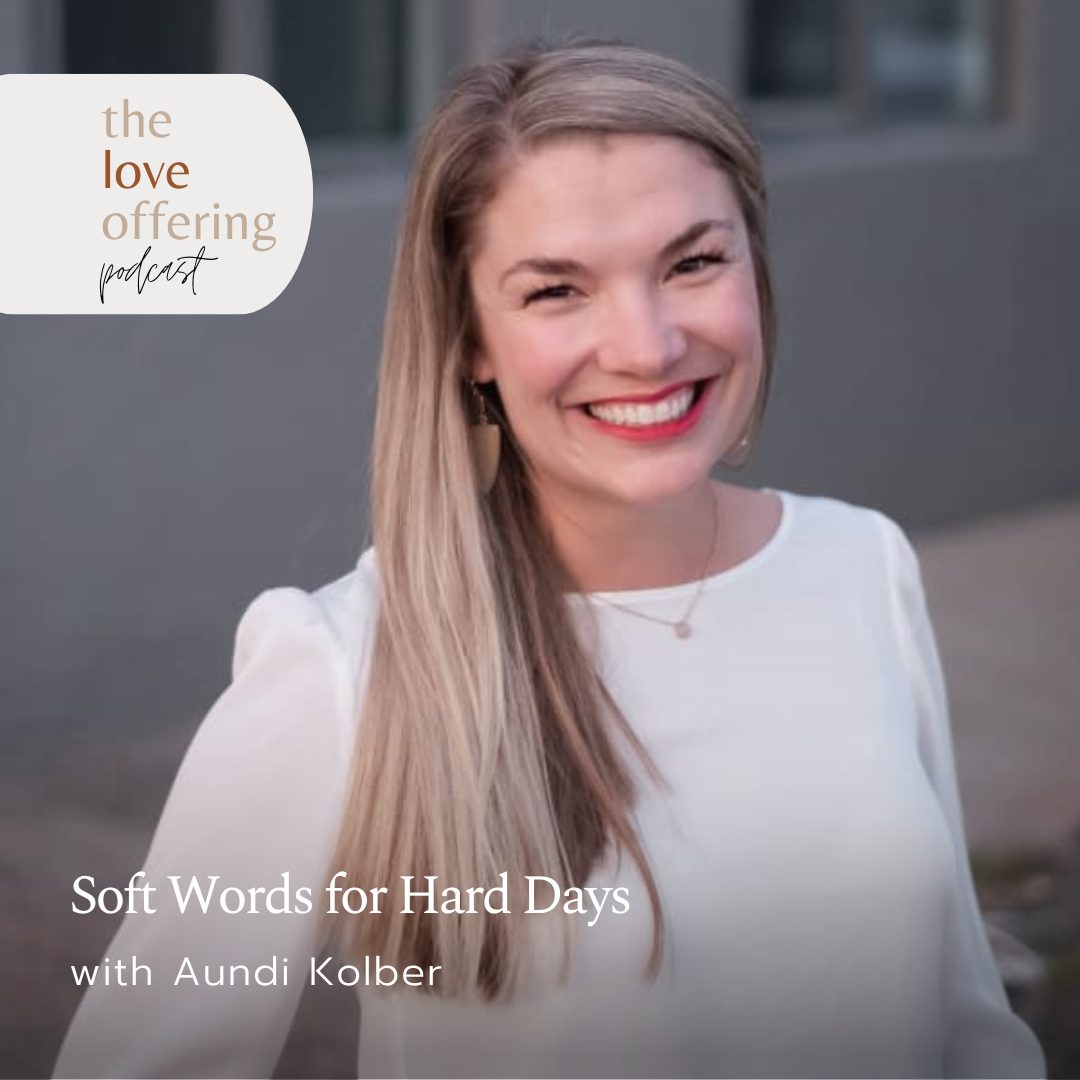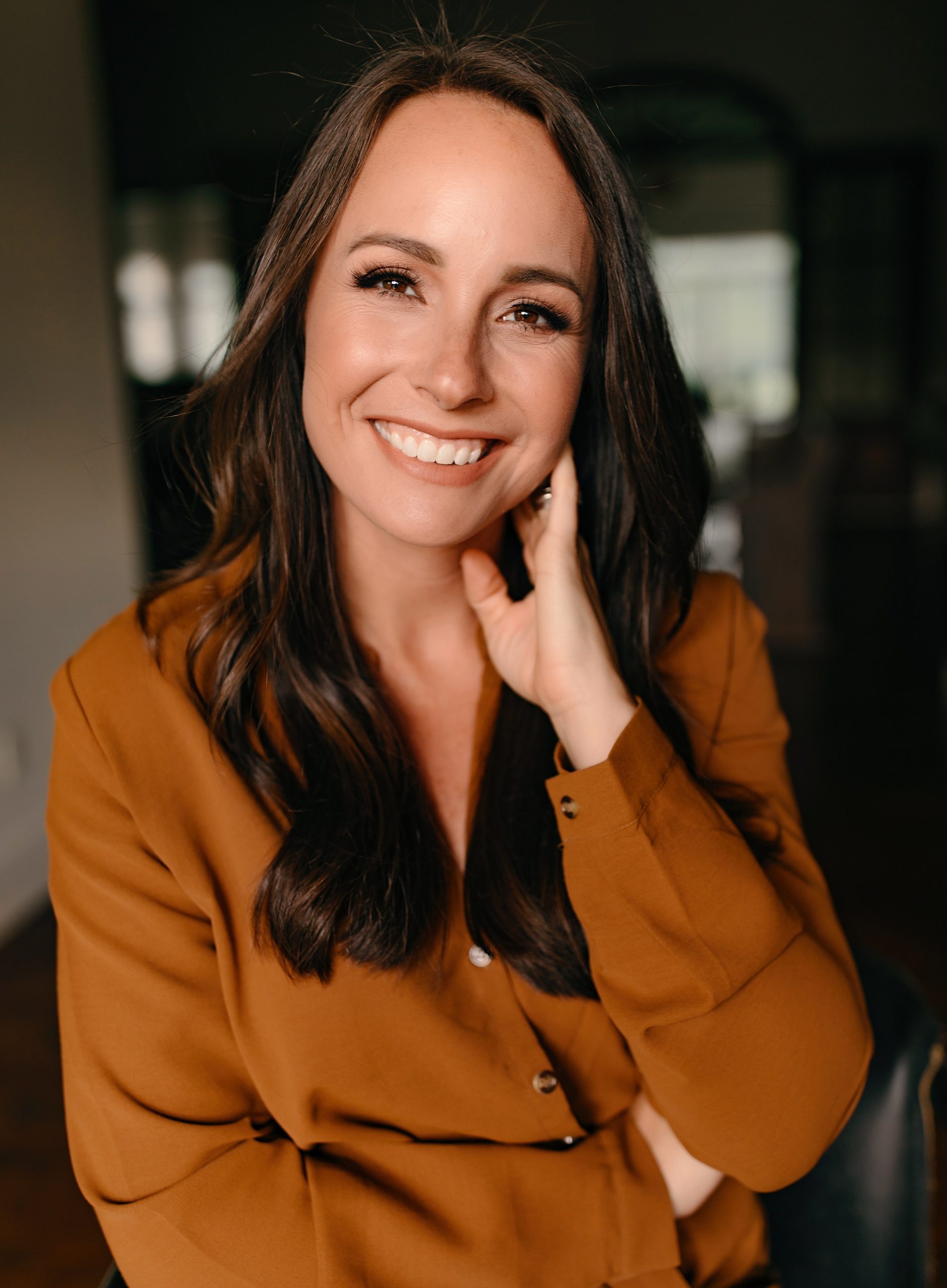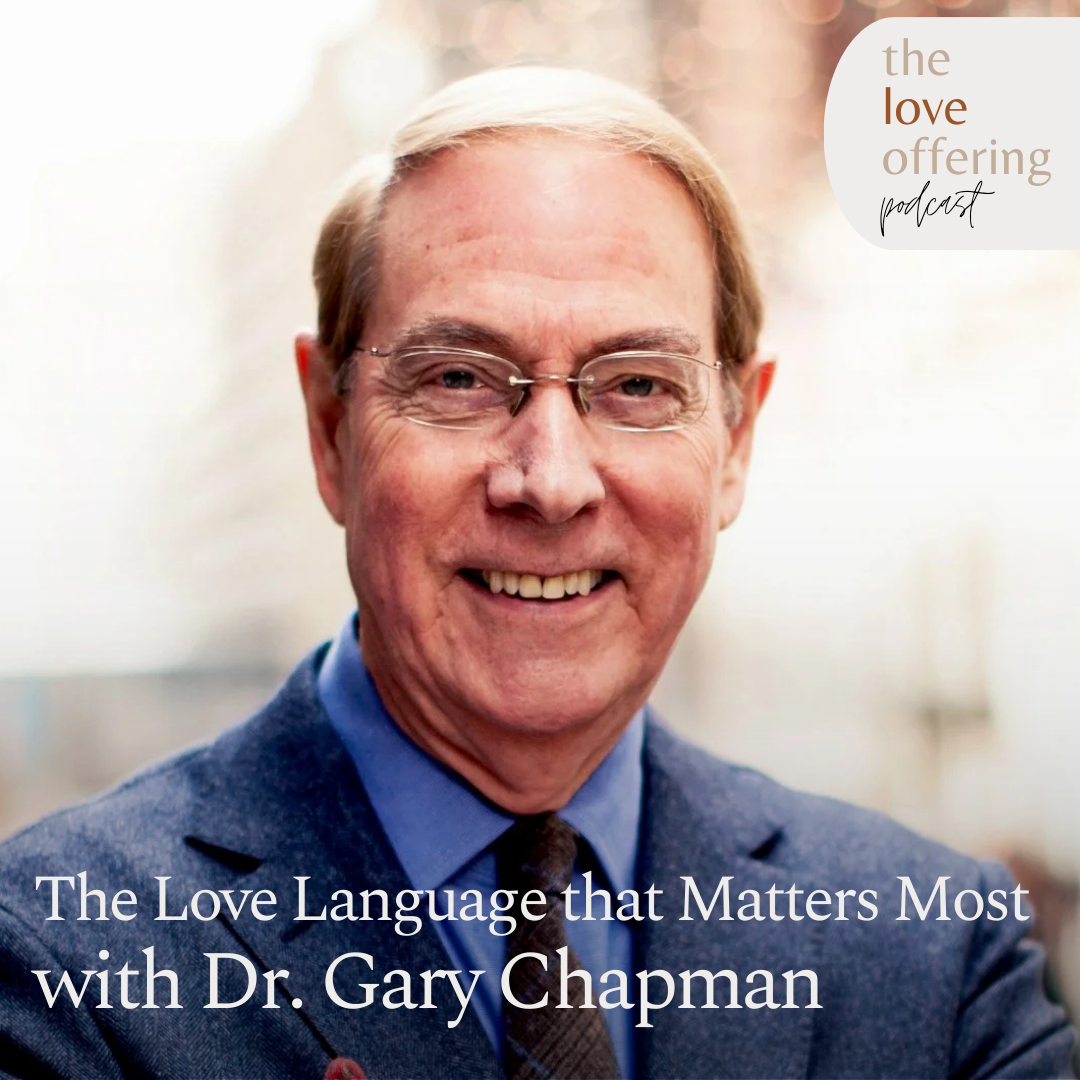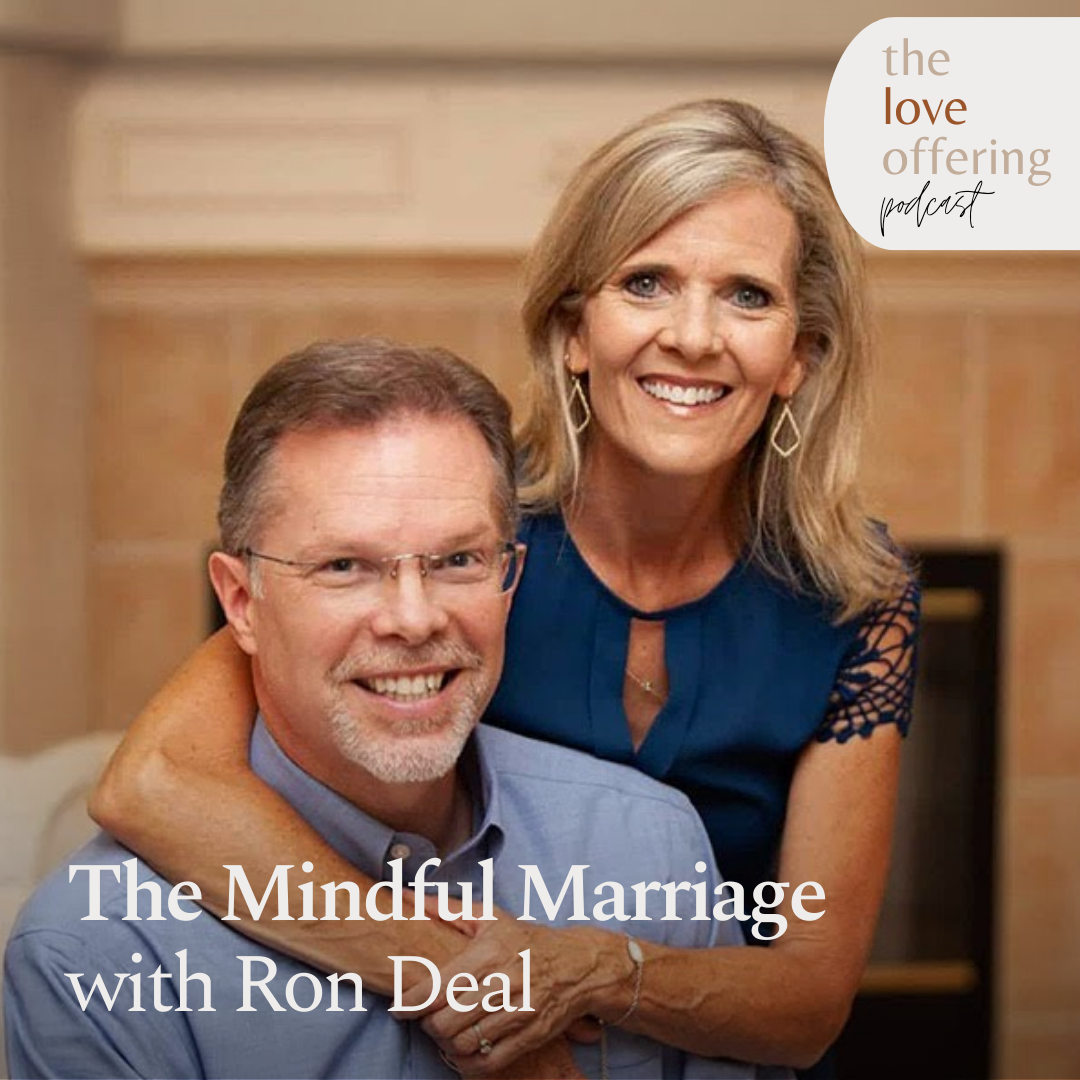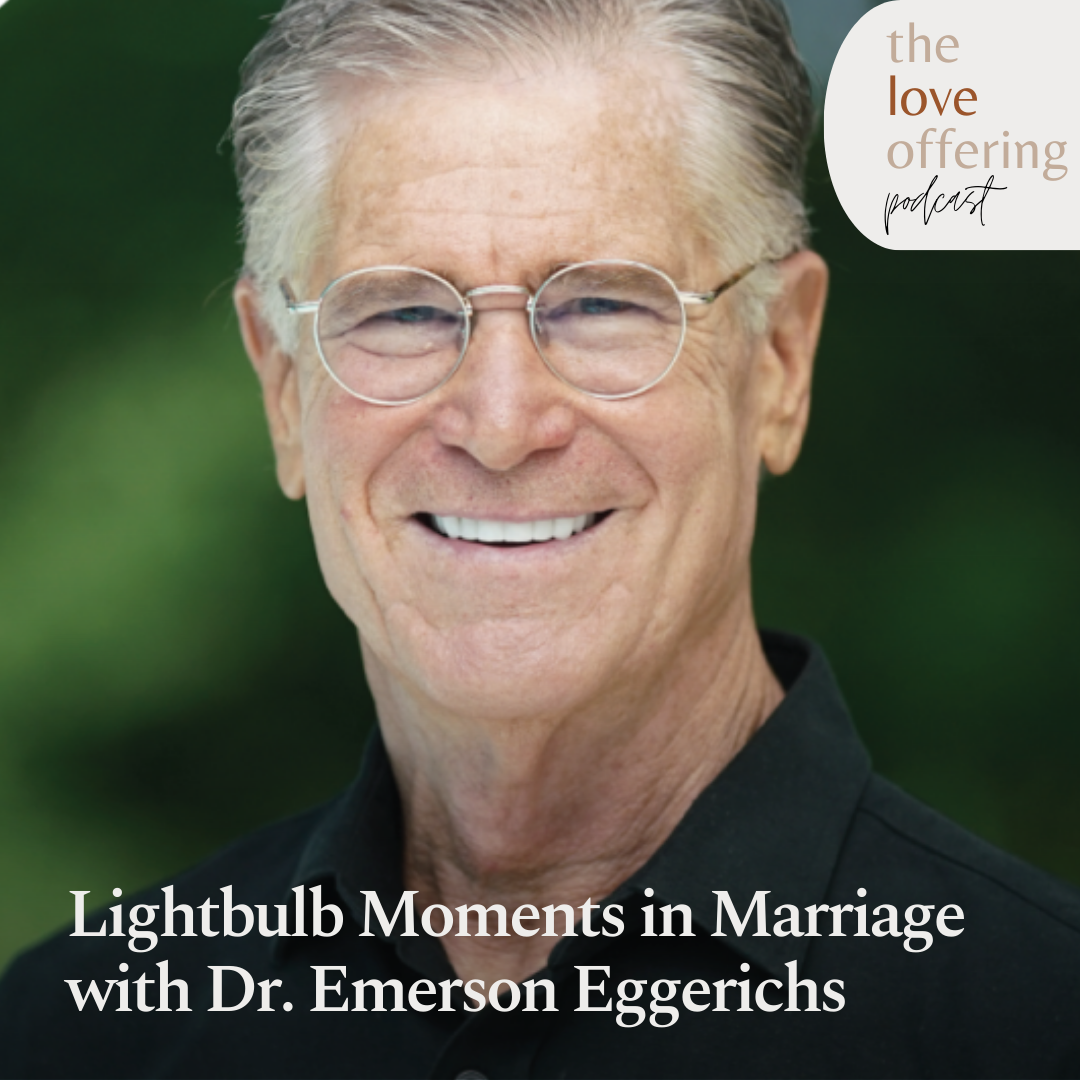Some days feel heavy. Some moments leave us wondering how to keep going. If you’ve ever longed for encouragement in the midst of life’s hardest moments, I have a special episode of The Love Offering for you.
This week, I’m joined by therapist and bestselling author Aundi Kolber to discuss her latest book, Take What You Need: Soft Words for Hard Days. This beautiful collection of quotes, scriptures, prayers, and gentle exercises is designed to be a balm for your most tender places—a reminder that you are never alone on your journey to healing.
For the days when fear is loud. When hope feels far. When you need a reminder of who you were created to be. Aundi’s words offer a gentler way forward, filled with grace, compassion, and the assurance that God is with you, even here.
In our conversation, we explore:
✨ How to hold space for yourself and others in difficult seasons
✨ The power of compassionate words when life feels overwhelming
✨ Practical ways to embrace healing and take one more step forward
I can’t wait for you to listen and be encouraged. You can find the episode here The Love Offering – Rachael Adams – Christian Podcast or wherever you listen to podcasts.
And if you’re looking for a beautiful, supportive resource for yourself or a loved one, Take What You Need is one to keep close by.
With love and encouragement,
Rachael
Summary
In this episode of the Love Offering Podcast, host Rachael Adams speaks with Andi Kolber, a licensed professional counselor and author, about her new book ‘Take What You Need: Soft Words for Hard Days.’ They discuss the integration of faith and psychology, the importance of body awareness in healing, and the role of community in the healing journey. Andi shares insights on taking the first steps toward healing, emphasizing the need for compassion and connection. The conversation highlights the significance of understanding our belovedness and identity in Christ and concludes with a heartfelt prayer for those struggling with burdens and trauma.
Takeaways
The book ‘Take What You Need’ offers accessible resources for healing.
Faith and healing can coexist without being separate.
Healing is a process that often resembles a spiral.
Connection to our bodies is crucial for emotional healing.
Acknowledging pain is a courageous first step in healing.
Community plays a vital role in the healing journey.
Our belovedness in Christ is foundational to our identity.
Healing requires honoring our body’s pace and needs.
Small steps can lead to significant healing progress.
The journey of healing is more like a dance than a checklist.
Sound Bites
“Faith can be a profound resource for healing.”
“Take what you need is about returning agency.”
“Healing is a little bit like a spiral.”
“Our bodies matter in the spiritual life.”
“We are wired for connection.”
“Nothing can separate us from God’s love.”
Chapters
00:00 Introduction to Love Offering Podcast
01:11 Andi Kolber: Author and Trauma Therapist
06:29 Exploring ‘Take What You Need’ Book
10:37 The Importance of Body Connection in Healing
15:49 First Steps in Healing for Overwhelmed Individuals
20:33 The Role of Community in Healing
26:21 Understanding Our Belovedness and Identity
30:34 Closing Thoughts and Prayer
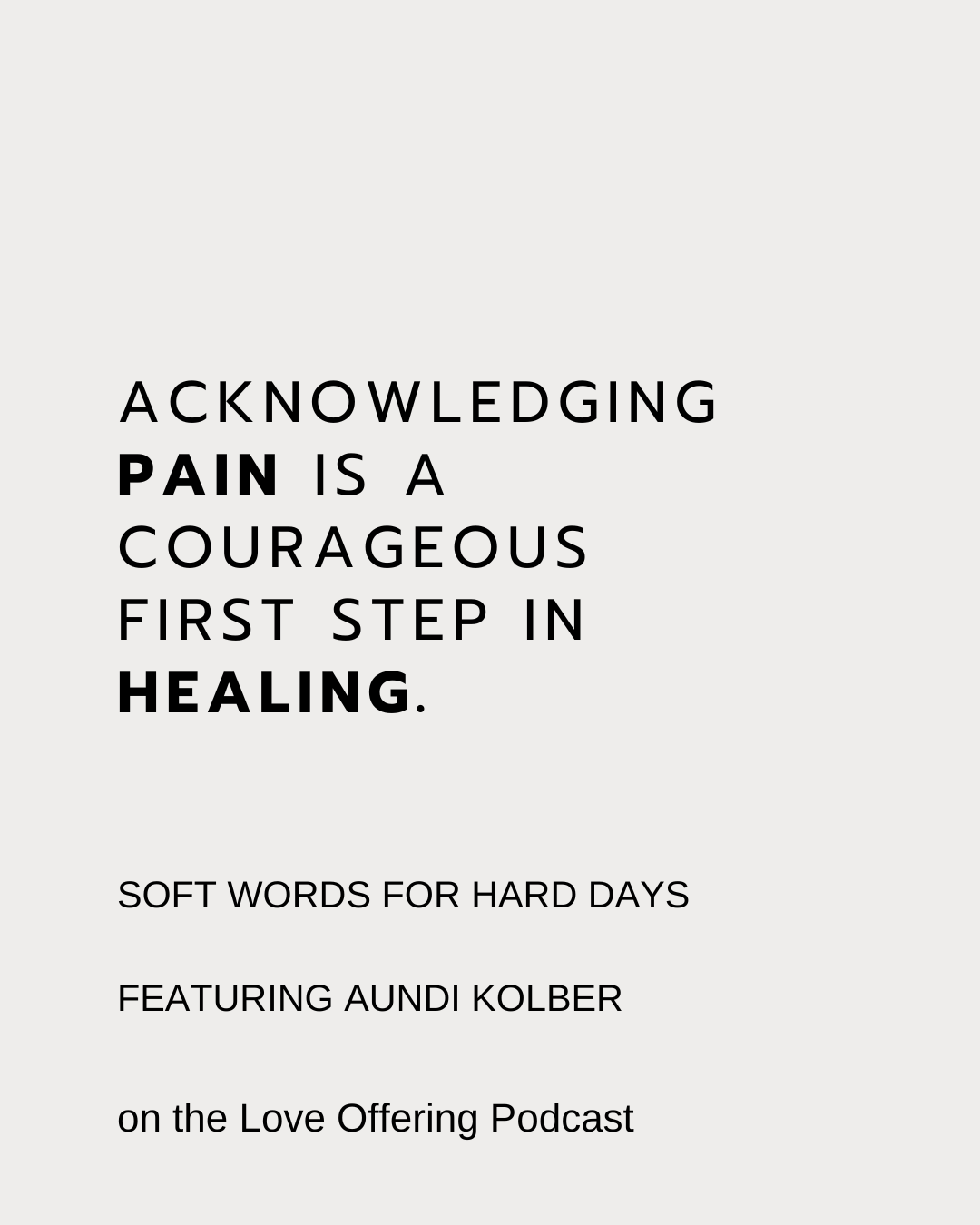
Transcript
Rachael Adams (00:01.139)
Welcome to the Love Offering Podcast. I’m your host, Rachel Adams, author of Everyday Prayers for Love, learning to love God, others, and yourself. Each week, we dive into meaningful conversations about how to live out the greatest commandment, loving God with all of our heart, soul, mind, and strength and loving our neighbors as ourselves. Whether through inspiring stories, practical tips, or biblical truths, I hope to encourage you to live boldly, love faithfully, and reflect God’s love in your everyday life.
Today’s guest is Andi Kolber. She is a licensed professional counselor and best-selling author of the critically acclaimed Try Softer and her new book, Take What You Need, Soft Words for Hard Days. She has received additional training in her specialization of trauma and body-centered therapies and is passionate about integrating faith and psychology. As a survivor of trauma, Andi brings hard-won knowledge about the work of change, the power of redemption, and the beauty of experiencing God with us in our pain. Well, hello, Andi, and welcome to the Love Offering Podcast. I’m so happy to have you.
Aundi (01:11.202)
Hello, thank you so much for having me. It’s good to be with you.
Rachael Adams (01:15.06)
Your book is described as a bomb for life’s most challenging moments. What inspired you to create this collection of quotes and reflections?
Aundi (01:27.0)
Well, you know the title of this book, as you said, and thank you for what you shared, but it is Take What You Need, Soft Words for Hard Days. You know, in my work as a trauma therapist and in the writing that I’ve been doing for, you know, I think it’s been a little over five years since Tri-Softer came out. One of my deep desires, and I feel like the work that, you know, I feel like God has called me to, is to help oftentimes translate work that is done in therapeutic settings into accessible resources for folks and mainly, you know, for folks who are wanting to integrate their faith in their healing process. think so often I think people feel like they have to choose between like, I do like a devotional? Or do I work on you for a lot of trauma survivors, it’s like, or do I work on more like things that will help me heal from the trauma? And it’s not that I want those things to be separated in so many ways. You know, I believe faith can be just such a profound resource. I believe God is the author of our healing. And yet, there are lots of complicated reasons, right? Sometimes folks have weaponized faith, or there have been things, and there are all these reasons that it doesn’t always feel possible. And so a lot of my work has brought what I would call a trauma-informed lens to this kind of work, this approach. And so take what you need has been sort of like this overflow of my learning and innovation around how do I bring this approach of really offering lots of invitational agency to folks in the process of healing because so often for people who identify as a trauma survivor, but maybe even for people who don’t, know, you’ve just gotten used to people assuming like, here’s what you need. Like, I’m not even going to ask you, like, I’m just going to tell you, you know, maybe even they’ve told you what God has for you, and you’re like. That does not resonate. God is not telling me that, right? There is this way in which we need other people, and indeed, God can work with and among the community, but we are also included in that journey, right? And so take what you need is this work for me too; it started first, like in social media, and I got inspired from seeing, you know if you go to a place where someone’s like giving out supplies that someone might need or food. It’s like taking what you need. And when I would see that, I was like, that’s sort of the energy that I want people to experience when they’re interacting with a lot of this work because it requires the person to check in with themselves and to sort of say, okay what is it that I do need? Instead of feeling like, you know, someone is just parachuting in and telling you what you are experiencing, that whole process is part of what healing looks like. There is a return. So often, when we’ve been wounded, when we’ve been traumatized when we’ve been harmed, what part of what happens neurobiologically is a disconnection from ourselves? And so, yeah, this book came out of this journey of wanting to, from the get-go, sort of return some agency and power to readers to say, look, I know some things. There are some things that I, you know, have expertise in, but I believe that God is with you and gave you wisdom in your body. So, I invite you any day, particularly when you’re like, I don’t know. I’m barely keeping my head above water, and you want me to read a 250-page book? Like there are just seasons of life. I know we both talked about it before we started being moms. I have had multiple seasons where I’m like, I got, I got no time. I have teeny amounts of time. So, what would it look like to participate with God in this healing journey? And so that’s kind of my hope and my desire to take what you need.
Rachael Adams (06:29.586)
Yeah, it takes the pressure off. I think there’s just such grace in that process. And so, how does your new book build upon the themes of trying softer and your other writings? Like what is unique about this one or does it just is it just a building block?
Aundi (06:45.678)
Mm-hmm. Yeah, great question. Think certainly because this is more like pulling, so within the book, one of the things that’s different is it is driven by like beautiful pictures and visuals, you know, so this is my first hardback book. It’s like a full color and it has the design team did a phenomenal job. And so, part of the hope was in a way too, so this is both from Try Softer and Strong Lake Water and from the guided journeys that I did with both. And almost like it’s practically a re-imagining of some of the content because I think sometimes when you’re reading a regular book, you get into it, maybe read something, and then skip it. And perhaps it didn’t fully digest because you’re just in the process of trying to read. And so, what I tried to do with this book is sort of change the format so that, for example, the book is laid out in these little chapters. They’re not super long, but there’s probably like 20 of them. And there’s a prompt at the beginning. It’s sort of like taking what you need when you’re exhausted. Take what you need when you feel alone. Take what you need when you need to know that God is with you. And so, I would say what is different about this book is that it’s a little bit more like I hope people experience it as maybe in Try Softer, I’m doing a lot of teaching. I’m doing a lot of psychoeducation. I definitely agree, and there are little bits of that within this book. But it’s almost like, hope people experience this as almost like, can I sit with you and help you practice listening? And part of the listening, it’s like the conversation. In a way, hope they feel the resonance, you know, I hope they feel the resonance between my words and them. I hope that they think of the resonance between the Spirit of God and them and that this beautiful dance is happening. And so, I think when we take it out of the original context and we put it in this new one, my hope is that it is like a new experience of like almost a deepening of maybe things that they even are somewhat aware of. But sometimes, well, not sometimes, I think almost always, healing is a little bit like a spiral. Right? And I see this all the time in therapy that, like, maybe we’ve worked on an issue, and there’s maybe some resolve, and then perhaps a couple of months go by, and you come back to that similar issue. But as you’re working on it, you’re noticing it’s not exactly as it was before. There’s a new angle. There’s a new invitation. There’s a new way in. There’s new learning. You’ve gained new resources. Right? And this is this deepening that I’m talking about. that is, I think so much of this is about experiential. It’s about practice. And I think, I hope that readers will feel a lot of compassion in that process.
Rachael Adams (10:22.644)
Yeah, I have no doubt. Well, we will take a brief break to hear a word from today’s sponsor, and when we come back, we will talk about gentle exercises to tune into your body and feelings.
Rachael Adams (10:37.318)
Welcome back. As I mentioned before the break, you include gentle exercises for tuning into your body and feelings. Why is this connection to our body significant on the healing journey?
Aundi (10:48.898)
Yeah, well, such a great question, and I think it’s easy. I believe in our culture, the like Western culture, and then I would often say in Christian culture too,o like there has usually been this implicit narrative that we’re either like we’re just spirits or that maybe we’re like a head walking around. Right? This is infused in so much of our culture where, for example, in Try Softer, I talk about what I have coined as functional Gnosticism. And so, Gnosticism was a heresy that was targeted by some. I’m trying to remember the exact century, but it was like the 13th century. I might be wrong on that, but essentially, it was this idea that our spirit, things that were spiritual, were more holy than those that were flesh, like matter. It was connected to this idea that we have a God and Jesus, who became fully human. And therefore, if that were real, it would sort of push up against the reality of God fully embodying humanity and make it difficult for that to be entirely true. And so, I think a lot of people know this idea cognitively. They’re like, our bodies matter, right? How we experience things in our body, like when we have a sickness or wounds when we aren’t feeling good, is significant. Those impact us, but a lot of people have been taught to, other than if it’s extreme, to essentially bypass your body or maybe shame your body or to see your body as just essentially not part of the spiritual life. And so, I think this matters on so many levels.
And first and foremost, thinking about this from a faith-based place, when we look at the incarnation of Jesus, we see the full embodiment of both fully God and fully person, right? And that’s a significant model for us: we are not simply spirits walking around. We are full humans. And the other part of that, more from like a nervous system, trauma healing lens, is that the internal disconnection from our body is actually what keeps us from being able in many respects from healing.
Now, there’s a part of this, we could do a whole show about it, so I’m not going to go all the way down, but I’ll say that there are parts of this that sometimes we don’t have a choice. When we go through intense, overwhelming, disturbing experiences, this is part of how we’re wired to survive, and that’s valid. Part of what gets complicated is when there’s a narrative or we have continued to feel like we can’t listen or attend to what is happening in our bodies. And that internal disconnection often feeds this experience of, like, I can’t tell you how many folks and Christians there are. I know in my head God loves me. I cannot feel it in my body. Or, you know, this person cares about me, but I don’t believe that is true, right? And all these various ways, oftentimes this internal work and sometimes it takes as long as it takes, right? Like we’re humans, we’re fragile, God knows that our belonging, our belovedness and connection to God is not predicated on how quote unquote healed we are. But it does affect the extent to which we can embody the truth of how God sees us and who we are made and designed to be. And ultimately, our ability to move through pain. So, coming back to the original question, these practices, this way of being in the world, are ultimately about wholeness, integration, and the ability to, at the pace we’re able, participate with God in stewarding compassion for our whole selves.
Rachael Adams (15:49.269)
I’m just mindful of the woman today who is really needing a lot. She is just in that place where it just feels heavy, and she just feels lots of burden, and she needs healing. So, how would you encourage her, maybe if she feels stuck and overwhelmed, to take that first step in healing? And maybe what would that first step be?
Aundi (16:07.158)
Yeah, well, I would say when I hear that, you know, for that person who’s hearing it, I want her to know is that even as I hear that, I feel a lot of compassion in my body when I hear that because I think that is so common. It’s way more common than I believe that we, most of us, are willing to name. And I think even being willing to allow yourself to acknowledge that is something. And I want to say that because I think so often, we feel like we have to be like, we want to go from zero to 60. We want to be like, I cannot tell you how many people start counseling, and their first question is how long this will take. Right? And I want you to know, like, if you’re one of those people, it doesn’t mean you’ll be in counseling forever. But I want to invite you to know that the process is as valuable as where you’ll go; how we do what we do matters as much as what we do. And so, for that woman, I want to encourage you to know, first and foremost, that you’re not alone in that and that it’s courageous to bring that to your awareness. I would invite her to notice, is there What feels, I use the language sometimes of a resource like Is there, like for example, does faith feel like a resource right now? Does it feel like a resource to consider that even now, even at this moment, God is with you and moving towards you, you know? And that could be a spark towards compassion for yourself? And I also want to say if it’s not, that doesn’t make you bad, right? Sometimes, those wounds allow that to get a little bit stuck. But what we’re doing is getting curious because what is the slightest movement in the direction you want to go? So, is there one person that you feel like you could name that to? If there’s no person, is there a place right now that feels like you could, mainly since we talked earlier about how beautiful Michigan is in the summer? You know, and it’s lovely in the winter, too, but as I think about it, we can offer ourselves some resources and compassion in so many ways. And so even if that’s sometimes literally going outside, like a lot of times in the summer, I’ll invite people to like put their feet literally in the grass because what we’re doing, and that might sound a little funky, But what we’re doing is we’re working on getting back into our bodies in a way that is feeling like tolerable and not overwhelming, not flooding to our nervous system. Once we begin that, we might consider this as where we can take even one practical step. So that might be finding a therapist, which there’s no shame in that. And I encourage folks to be curious about that. It could be. So, what I was hoping you could notice the theme here is that there’s some connection. Because oftentimes, this sign that there is just too much is a sign that our body cannot hold like it’s beyond our capacity right now to keep what we’re having. And so, we’re looking for some channel that allows us to begin to come back to ourselves in a way that feels safe to us and then looking for what would it look like to get the support we need to be able to begin to both heal and sometimes even build our capacity. But we’re doing that in a compassionate, gentle way. And so, I think those are the kinds of keys that matter in this journey.
Rachael Adams (20:33.0)
We will take a brief break to hear a word from today’s sponsor. And when we return, we will discuss the critical role community plays in our healing journeys.
Welcome back. Like you said, many of us can feel very alone and maybe disconnected in our struggles. So how can you? How do you think that community also plays a role in the healing journey for women and men?
Aundi (21:03.938)
Yeah, yeah, absolutely for us all. Yeah, I would say we’re coming up against a paradox that I think is important to name. And the paradox is, first and foremost, we’re wired for connection. When we look at, for example, the Trinity, God is a connection, and God is a core relationship to God. And so, it’s not a coincidence that we feel like we’re a complete system, even within ourselves. Like we’re not just one stagnant being that doesn’t change or doesn’t have different parts of ourselves. We’re more like a constellation than just one singular thing. And then that includes other relationships, right?
Like that, we need other people, And this goes into and again, I won’t go all the way down this road. Still, you know, starting from our earliest breaths, even in our mother’s tummy, like all these things about sort of what would be called like neurobiological expectations about what needs to happen so that we can grow that so that we can feel loved so that we can feel safe so that we can feel settled. So that’s what we’re made for, and many folks have experienced, know, relationships are often also sort of the ground at which many harrowing things happen. For some people, the worst pain has happened. And so this is this point where we hold this very gentle posture because we never, and again, this even comes back to the title of my book, like, take what you need. It doesn’t mean that you won’t need a connection, but we want to honor the pace of our body as we engage in this kind of work. Because if we bypass the signs of what we’re experiencing, it oftentimes will backfire, right? Like it will, it will come out in ways, or we will feel more stuck because we’re not honoring the pace. And so when it comes to community, I think, first and foremost, even just beginning to acknowledge that it can be complicated. I think, and I hope, that maybe people will feel validated because when we assume that, it will be easy. Like, you know, like I think there’s this desire. Of course there’s a desire to like, I found my people. I found my connection. They get me. I feel so seen. And that’s beautiful. Those are good things. And in that process, we will almost certainly bump up against things. And this is where we do this work in so many ways. It’s Jesus’s words of loving your neighbor as yourself. And where it’s like we’re dancing with this reality because we want to consider the experiences of those around us and check in with ourselves. And in that process, it creates pathways for connection, for potential like reparative experiences of things that maybe happened in other parts of our lives, maybe when we were growing up, maybe in significant friendships, maybe in our teenage years, maybe in romantic relationships, maybe in faith spaces, right? Because those wounds can also heal. And this practice of doing this, you know, if you are a person, work a lot with folks who have pretty extensive attachment trauma. I would say permitting yourself to start small is an excellent and compassionate posture because that small work builds, and sometimes that is like therapy. Sometimes, that is with one person. You’re like this person. I trust in this person, my nervous system, like my body feels fairly settled. And the work there is not to be like, well, this is what it will always be. But it helps us scaffold at the pace we can build on those things. So, and then for other people, it’s going to maybe, they’re going to have a different pace. Maybe they can go a little bit quicker. Maybe they have an intuition that this is what works, and you will find that, too. And so just giving yourself and as you’re able giving others that grace to sort of flex and bend, I think it’s a lot of this work, which is a lot more like a dance than it is a checklist.
Rachael Adams (26:20.82)
Goodness, that is so freeing to hear. You mentioned our belovedness earlier, and you often speak about that in our identity. So, is there a biblical concept of love that you think applies to this topic? You’ve already mentioned it quite a bit, and I’m so appreciative of that.
Aundi (26:38.99)
Yeah. Mean, several come to mind. I think, yeah, the one that feels especially resonant right now is when I think of Paul’s words in Romans eight, when he talks about that, you know, essentially being confident that there’s nothing. Love this. I love this verse so much. There is not one thing right, and he gives us a whole list, such as heightening our depth. Angels are demons like, know all these different things, and I almost feel like it for me It invites this idea of like you could keep going because he says nothing could separate you, and to me, when I think about that,t it actually like that is You know, there’s a psychological term called like attachment Right? Attachment is ultimately a secure attachment based on the prediction that there will be repair when a rupture occurs. And so, when I hear Paul’s words, I talk about them. Like I hear this articulation of confidence, there’s not one thing. Right. And then the way that speaks to us that like and certainly, right, like all the caveats I’ve given throughout our time like there are all these reasons why we may not fully be able to embody it, but what a beautiful, just sort of piece of gold around some the truth of that indeed, what a place to land. This place is where nothing could separate us from God’s love.
Rachael Adams (28:32.286)
That’s so beautiful and reassuring that we have that safety and security in him. That’s so beautiful. So, is there something that you are loving right now? This can be anything that comes to your mind.
Aundi (28:45.932)
Yeah, you know what comes to my mind, which feels small, but I’m just going to permit myself to love it. I love it because it’s pretty cold in Michigan right now. I love sitting next to our fireplace. Like I love being able to be near that warmth. And you know, I’ll often like a journal, read, or reflect near that space, and I love being there. It’s cozy, and so it’s something I’m enjoying.
Rachael Adams (29:17.68)
I am so similar to you in saying that my children said the other day, “We should go skiing or something.” I was like, “That’s fine. You all can go skiing.” And I’ll sit by the fireplace with my book, cup of coffee, and just a blanket, be so cozy, and look at the beauty.
Aundi (29:34.862)
Yes, the warmth is nice. I love skiing, but I hear you, and it sort of takes a, you got it. It’s like a different mindset. It’s just sometimes, yeah. I mean, I think in the winter months and just that there is, yeah, that that’s a particular goodness that I love that we have that in common.
Rachael Adams (29:42.856)
Yes. So, Andi, I know I want to stay connected with you. I’m sure listeners will want to, so tell us how we can best do that.
Aundi (30:34.774)
Yeah, well, you can find me on Instagram at Andi Kolber and also on my website, andikolber.com. I have a newsletter and resources available there, so I’d love for folks to look at that if that sounds helpful to them. And then you can find my books anywhere. Books are sold.
Rachael Adams (30:54.549)
Well, thank you so much. I appreciate you being my guest today and giving us what we need. I hope everybody takes what they need today and tries a bit softer, but I’d like to pray for us as we close.
Father, we just love you so much and thank you for loving us the way that you do and for the promise that nothing can separate us from your love that we don’t have to earn your love or strive for your love, and that you will never reject us or betray us or hurt us, And so just pray for every hurting heart today, every woman that is just overwhelmed with burdens or trauma or whatever she may be experiencing, that she may feel seen and known and loved and cared for by you and that the people around her father that you would surround her with a support system of people that would be kind to her that would be your hands and feet and that would not force anything on her father but that they would just be gentle and that they would just be present with her in their pain that father you say that we rejoice with those who rejoice and that we Weep with those who weep. And now, today, maybe for the woman who needs somebody beside her to cry with her and be with her in that space, Father. And we pray that you would guide each woman to hear your voice, communicate to them what small steps they need to take towards healing today, and ultimately, you are the great healer. And so, we trust in you and trust in your sovereignty. And we thank you for this day. It’s in your holy and mighty name we pray. Amen.
Thank you so much for listening to the Love Offering Podcast today. I hope today’s conversation encouraged you and inspired you to love God, others, and even yourself a little more. If you enjoyed this episode, please share it with a friend and leave a review. It helps others find the show and spreads the message of love even further. To connect with me, visit my website at rachellekadams.com. While there, download the Love Offering Calendar, a free resource filled with simple daily ways to love those around you. Don’t forget to pick up a copy of my book, Everyday Prayers for Love, Learning to Love God, Others, and Even Yourself, and Andi’s new book, Take What You Need. They are available wherever books are sold, and we pray they are meaningful resources for your faith journey. A special thank you to Life Audio for supporting this podcast and making it possible. To find more great podcasts, visit LifeAudio.com. Thank you again for joining us today. Until next time, let’s make our lives an offering of love.
*Transcript AI-generated.

